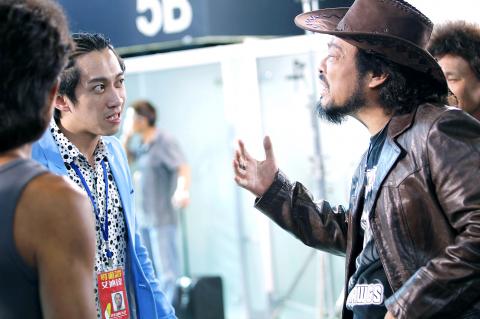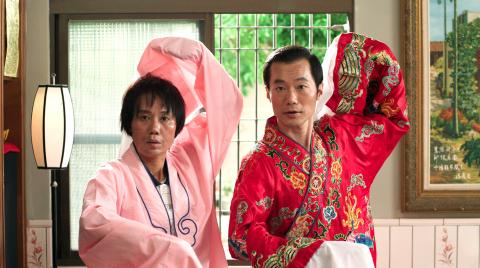As Taiwanese cinema rises from its art-house roots and learns to love its audience, it has become increasingly attractive to investors and grown in number over the past few years. Regrettably, quantity does not necessarily equal quality. The past year saw a slew of badly executed productions such as the slapstick farce Bang Bang Formosa (寶島大爆走), action flick Double Trouble (寶島雙雄) and family dramas Cornflower Blue (藍色矢車菊) and Joyful Reunion (飲食男女—好遠又好近). Though many of these movies received government film subsidies, not many people cared to go to the theater and see how their tax money was being spent.
Even those embraced by audiences didn’t fare well with critics. Box-office hits such as the mega-budgeted Black and White Episode 1: The Dawn of Assault (痞子英雄首部曲:全面開戰) and soap opera-turned-movie, The Fierce Wife Final Episode (犀利人妻最終回), were deemed critical failures.
Criticism aside, there are a number of films that stand out for their substantial stories and unique viewpoints. After tackling traditional Taiwanese mourning rituals in Seven Days in Heaven (父後七日, 2010), director Wang Yu-lin (王育麟) finds inspiration again in the country’s rich popular culture with Flying Dragon, Dancing Phoenix (龍飛鳳舞). This time, gezai opera (歌仔戲), also known as Taiwanese opera, takes center stage. Like Seven Days in Heaven, Wang’s latest film blends comedy with high-energy melodrama and throws in a touch of local zest to weave a flavorful tale about a family-run opera troupe and how its members make the best out of life despite repeated setbacks.

Taipei Times file photo
For his second feature, GF*BF (女朋友。男朋友), director Yang Ya-che (楊雅?) chronicles the lives of three friends over a period of almost 30 years (1985 to 2012), showing how they get caught up in the sociopolitical unrest on the eve of the lifting of martial law and the student movements of the 1990s, to their later acceptance of their place in the world in the new millenium. Though the film is not without its flaws, Yang deserves accolades for creating an ambitious picture about loss and longing with a solid cast led by Kwai Lun-mei (桂綸鎂), Joseph Chang (張孝全) and Rhydian Vaughan (鳳小岳).
Noted for his cinematic exploration of memory and nostalgia, director Hou Chi-jan’s (侯季然) When a Wolf Falls in Love with a Sheep (南方小羊牧場) depicts a sweet, youthful romance that takes place on Taipei’s cram-school street — Nanyang Street (南陽街). Featuring young star Kai Ko (柯震東) and new talent Jian Man-shu (簡嫚書), the film is buoyant to look at with the help of lively animated sequences and visual ingenuities that can be best illustrated in the scene where tens of thousands of paper planes glide through the street. Hou’s penchant for using numbers, symbols of time and old artifacts conjures up the images of Wong Kar-wai (王家衛), and with this stylish flick, the promising director successfully creates a fairytale-like, imaginative world where young love and hope bud and thrive.
With Touch of the Light (逆光飛翔), up-and-coming filmmaker Chang Rong-ji (張榮吉) chooses a simple, honest approach to tell a warm-hearted, inspirational story about the friendship between a melancholy young woman and a talented pianist who lost his eyesight when he was little. Much of the film’s charm comes from the well-cast leads Sandrine Pinna (張榕容) and Huang Yu-siang (黃裕翔), who, in real life, is the first visually impaired person to graduate as a piano major from the National Taiwan University of Arts (台灣藝術大學). Touch of the Light can be seen as an extended version of Chang Rong-ji’s 2008 short film The End of the Tunnel (天黑), which stars the same Pinna and Huang but compacts emotions that linger much longer.

Photo courtesy of Swallow Wings Films
In the realm of documentary film, director Jasmine Lee (李靖惠) spent 13 years following four female Filipino workers whom she first met in 1998 at a nursing home in Taipei. The end result is Money and Honey (麵包情人), which takes an intimate look at the women who work far from home in order to support their families. Lee takes multiple roles in the documentary project, not only as a filmmaker behind the lens, but as an active participant in front of the camera, who befriends the workers and even accompanies them back to their hometowns in the Philippines. As a result of Lee’s extensive on-site filming of her characters, the strength of the documentary lies in its sympathetic, close and almost personal account of the women’s lives. Systemic injustice and discrimination are only touched upon.

Towering high above Taiwan’s capital city at 508 meters, Taipei 101 dominates the skyline. The earthquake-proof skyscraper of steel and glass has captured the imagination of professional rock climber Alex Honnold for more than a decade. Tomorrow morning, he will climb it in his signature free solo style — without ropes or protective equipment. And Netflix will broadcast it — live. The event’s announcement has drawn both excitement and trepidation, as well as some concerns over the ethical implications of attempting such a high-risk endeavor on live broadcast. Many have questioned Honnold’s desire to continues his free-solo climbs now that he’s a

Lines between cop and criminal get murky in Joe Carnahan’s The Rip, a crime thriller set across one foggy Miami night, starring Matt Damon and Ben Affleck. Damon and Affleck, of course, are so closely associated with Boston — most recently they produced the 2024 heist movie The Instigators there — that a detour to South Florida puts them, a little awkwardly, in an entirely different movie landscape. This is Miami Vice territory or Elmore Leonard Land, not Southie or The Town. In The Rip, they play Miami narcotics officers who come upon a cartel stash house that Lt. Dane Dumars (Damon)

Francis William White, an Englishman who late in the 1860s served as Commissioner of the Imperial Customs Service in Tainan, published the tale of a jaunt he took one winter in 1868: A visit to the interior of south Formosa (1870). White’s journey took him into the mountains, where he mused on the difficult terrain and the ease with which his little group could be ambushed in the crags and dense vegetation. At one point he stays at the house of a local near a stream on the border of indigenous territory: “Their matchlocks, which were kept in excellent order,

Today Taiwanese accept as legitimate government control of many aspects of land use. That legitimacy hides in plain sight the way the system of authoritarian land grabs that favored big firms in the developmentalist era has given way to a government land grab system that favors big developers in the modern democratic era. Articles 142 and 143 of the Republic of China (ROC) Constitution form the basis of that control. They incorporate the thinking of Sun Yat-sen (孫逸仙) in considering the problems of land in China. Article 143 states: “All land within the territory of the Republic of China shall